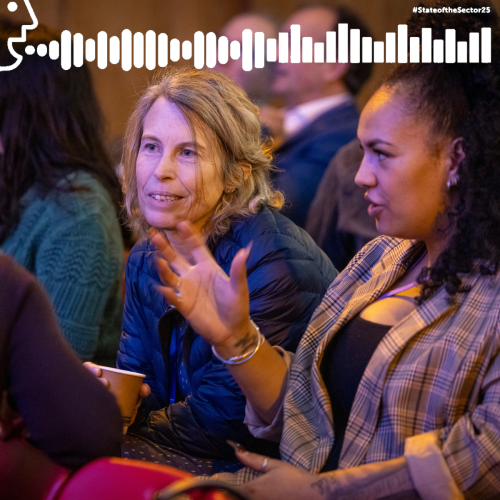Over the last few years, the relationship between the voluntary sector and the government has been challenging, described as ‘transactional’ by the National Council for Voluntary Organisations (NCVO). As part of the process of resetting this relationship, the Government - in an effort to develop a ‘more collaborative approach’ to tackling challenges - has begun creating a new Civil Society Covenant, led by the Department of Culture, Media and Sport (DCMS).
Working in partnership with NCVO, DCMS developed four principles of the Covenant, and shared these as part of a consultation looking to draw on the experiences of voluntary organisations working with statutory partners. In this post, we have set out these principles and summarised our response to the consultation.
The draft principles
- Recognition, to ensure a strong and independent civil society
- Partnership, to ensure effective service deliver and policymaking
- Participation, to ensure people and communities can be heard and make a difference
- Transparency, to ensure civil society and government have the information needed to best serve people and communities.
Overall, we agree that the draft principles set out a good foundation for effective relationships between civil society and public bodies. Our response reiterated the importance of recognising the voluntary sector’s expertise and experience and its distinct role in public life. We recommended a small change to broaden the scope of the partnership principle, to explicitly cover effective funding and commissioning of the voluntary sector.
To ensure that these new principles were upheld, we emphasised the importance of embedding them as part of the culture of both public bodies and voluntary sector organisations. This would help ensure an effective partnership between the sector and public bodies becomes integral to day-to-day operations, rather than just being a ‘nice to have’ or ‘box to tick’.
More can be found about what these principles seek to achieve on NCVO’s webpages about the new Covenant.
Working with public bodies
Clinks highlighted the barriers that voluntary organisations often face when working with public bodies. We noted that public bodies often look to engage with the sector late on in processes, when it is often too late for the sector’s experience and expertise to meaningfully contribute. We also highlighted that the voluntary sector is often only seen as a service provider, rather than as a key partner, and spoke about the variability of engagement based on the views of individual officials, the financial barriers voluntary organisations can face particularly around ‘unfunded signposting’, and the power imbalance in the relationship between the sector and public bodies.
To support effective relationships, Clinks called for recognition that many smaller and specialist organisations do not have dedicated fundraising and/or policy staff, and so capacity to engage may be limited, especially when requests come at short notice or at otherwise busy times of year. Moreover, even where organisations may have dedicated staff, they are likely already to be under increased pressure. As such, we called for prompt information sharing, with as many details as possible about upcoming funding, consultation, and partnership working shared in advance, as well as greater co-production of work with the sector, where it is involved earlier on in processes. We also highlighted the importance of public bodies following up with voluntary organisations they previously engaged with, so the impact of their contribution can be noted.
In terms of actions that public bodies could take to improve the relationship with the voluntary sector, Clinks recommended, amongst other things, moving away from reductive and short-term contracting models that do not make the best use of what the sector can offer, and recognising that there is a resource cost to voluntary organisations providing their expertise to public bodies and so considering compensating them for their time in appropriate cases.
Finding solutions
To support the voluntary sector to find solutions to societal problems and to innovate, Clinks called for the sector to be adequately funded to deliver its important work, as well as innovating where needed. We emphasised that in some areas, there is already good evidence about what works well, so innovation and forcing the sector to find a new solution is not always needed. Organisations need to be able to use their expertise to determine whether there is already something effective that could be delivered, or whether something new needs to be developed.
We explained that the most effective way to give the sector this flexibility is through the provision of unrestricted, multi-year grants. This would also help organisations to plan ahead and retain high-quality, experienced staff. This should be combined with processes, commissioning, and policy decisions taking a holistic and joined-up approach.
Find Out More
This new Covenant represents a significant opportunity to reset relations between public bodies and the voluntary sector, as well as between public bodies and voluntary organisations themselves. It offers an exciting chance to make tangible improvements, so public bodies and the sector work together in genuine partnership, break down barriers, and take a holistic, whole-systems approach. You can find out more about the Covenant on NCVO’s website and the DCMS Covenant webpages. The intention is for a new Covenant to be published in Spring 2025.
Read Clinks’ full response to NCVO’s consultation here
What's new
Publications
Latest on X
The role is for a leader from an organisation focused on racially minoritised people, with expertise in service delivery, policy, advocacy, or related areas in criminal justice. Racial disparities are present at every CJS stage. This role ensures these voices are central in shaping policy to help address and eradicate them. Apply by Mon 18 Nov, 10am. More info: https://www.clinks.org/voluntary-community-sector/vacancies/15566 #CriminalJustice #RR3 #RacialEquity

